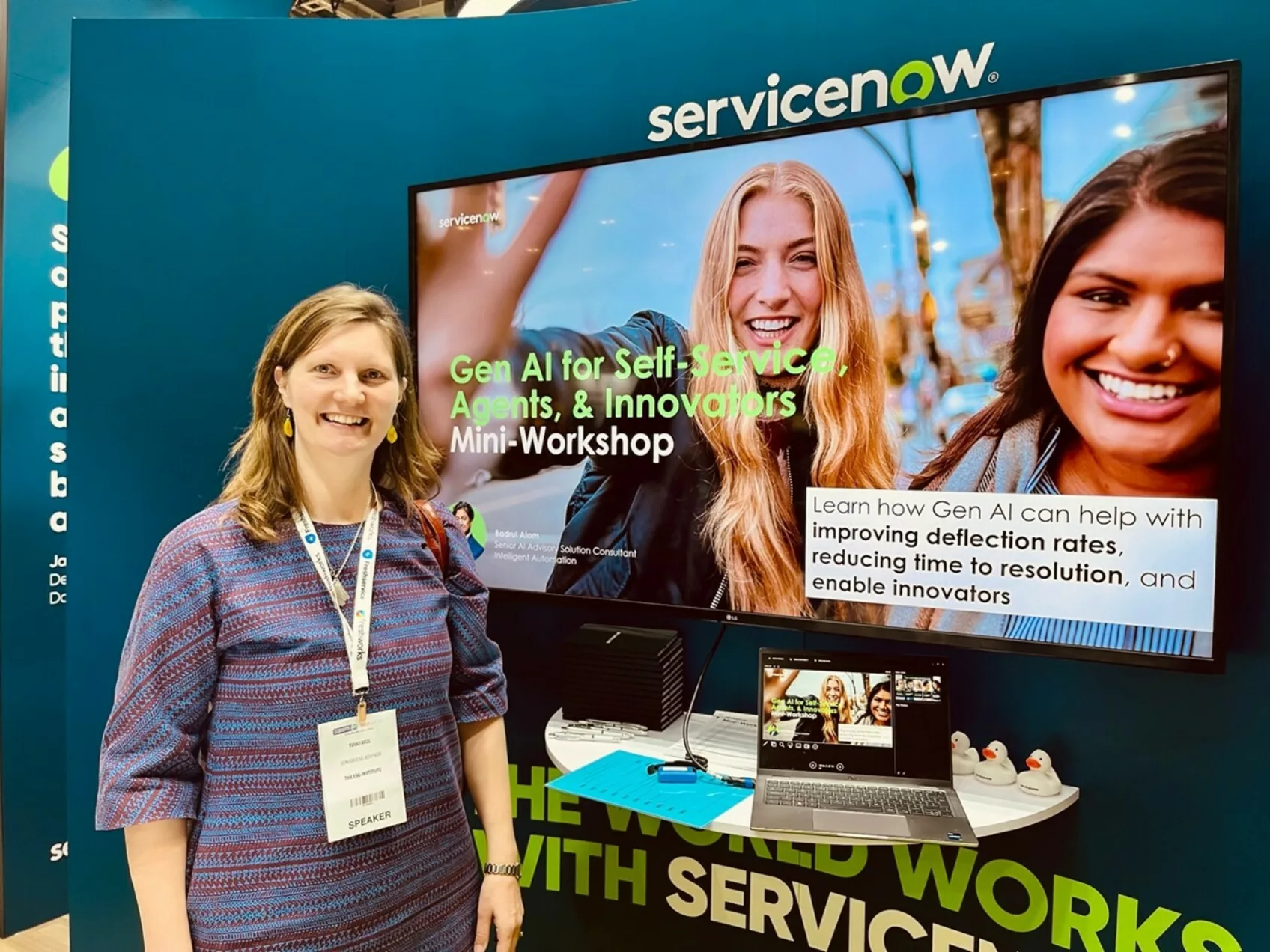The Service Desk & IT Support Show (SITS) is a staple of the ITSM calendar. This year, AI was understandably a hot topic – here’s what we learned about AI’s future in ITSM.
The recent SITS show in London was exciting, to say the least.
It was filled to the brim with discussions and talks on artificial intelligence (AI) – particularly around generative AI (GenAI) and its transformative potential for organisations.
Held over two days, there was a lot to take in about how AI will forever change the world of IT service management.
Unleashing the power of generative AI in ITSM
Amidst the presentations and informal discussions with conference participants, ServiceNow took to the stage to shed light on how AI is revolutionising ITSM.
Paloma Garcia and Dale Cheeseman of ServiceNow showcased GenAI's capabilities, highlighting its role in driving disruption and innovation amongst the fastest-growing companies.
The focus on people, rather than technology, did not go unnoticed by the audience. Badrul Alom from ServiceNow provided a private demo of GenAI in the NOW platform – showcasing the efficiency of Now Assist and the platform's Virtual Agent (VA) capabilities.
Now Assist can create instant, accurate and up-to-date content such as reports, workflows and knowledge articles based on an end-user’s (natural language) query.
Where VA delivers a human-like conversation and can take care of several requests, Now Assist raises ServiceNow’s platform capabilities and its LLM (large language model) to a whole new level.
AI in ITSM: opportunities and challenges
As organisations explore deeper connections with AI, they face both opportunities and challenges.
Martin Goble from TCS highlighted the importance of Service Integration and Management (SIAM), emphasising the significance of people and processes.
Flexible contracts and collaboration with customers' suppliers, sometimes even competitors, emerged as crucial factors in this journey.
Especially in cases where the SIAM function (i.e. the integrator) is outsourced to a supplier, rather than retained within the customer organisation, the outsourced SIAM organisation may compete with other service tower providers.
In these instances, all parties need to be aware of possible tensions where the SIAM provider assigns work to other suppliers.

People first and the importance of data validation
Simone Jo Moore from SJM and Vawns Murphy from i3Works emphasised a "people-first" approach to AI and discussed the emergence of new roles like Data Detectives and AI Psychologists in their talk.
Data Detectives are a bit like business analysts on steroids who ensure data validation, process and investigation of data.
AI Psychologists guide the development of AI systems that not only learn and adapt but can also reason and understand in ways more akin to human cognition.
The speakers stressed the importance of AI ethics and the need to prioritise human input and criticality in AI-driven processes to ensure diversity of thought and decision.
Data validation was discussed in detail by Simone and Vawns; critical both for human-created and AI-generated content.
A lack of data validation can lead to incorrect and biased content, which, in turn, can lead to poor decisions based on bad data.
Personalisation, communication and rapid value realisation
Saurabh Upadhye from AWS highlighted the power of AI in personalising services – paving the way for tailored user experiences and enhanced customer satisfaction.
Putting this in the context of ServiceNow, this could be used to create an individually tailored service catalogue or a virtual agent trained to adapt to the user’s preferred communication style.
Major Incident Management was also explored, emphasising the integration of communications plans as a critical aspect of ITSM processes.
Here, the platform capabilities of ServiceNow combined with AI gives businesses a newfound flexibility and governance around interfaced ITSM processes.
Another advantage of using AI in ITSM is its potential to revolutionise businesses with rapid time-to-value and the importance of meeting people in their existing channels. For example, Now Assist allows users to interact with GenAI capabilities within the platform’s Employee Center – bringing its benefits to where they’re already working.
The rise of copilots
Jake Speyer from MoveWorks discussed the importance of finding the right channels for AI copilots (Microsoft Copilot being an example). He outlined four key pillars:
- Copilots for productivity, such as writing and reading emails, translating text or summarising meeting notes. These copilots help you save a bit of time every day.
- Copilots for business areas, for example, AI for GitHub or Einstein in SalesForce.
- Copilot for all employees, serving common needs such as ITSM or HR. ServiceNow Now Assist and ServiceNow VA fall into this category.
- Proprietary focus copilots. These include the likes of Copilots developed for Morgan Stanley and others. These are typically built in-house.
Joel Eijssen from OpenText highlighted a 50% increase in productivity in knowledge tasks using AI. For many organisations, knowledge workers are high-value employees.
An increasingly heavy knowledge workload combined with the expectations of flexible working by the youngest generation may make the adoption of copilots “a critical path for nearly 50% of technology organisations”, as suggested by ServiceNow’s Dale Cheeseman in his talk.
Not adopting the latest GenAI technologies means organisations could risk an increased turnover of staff if they can’t keep up with employee expectations – resulting in increased costs across staff training and recruitment which, in turn, hampers growth and customer acquisition.
Conclusion: Embracing the AI Revolution
As organisations continue to embrace the AI revolution, it's essential to balance technology and the human touch, as rightly pointed out by Simone and Vawns.
By ethically leveraging the power of GenAI, organisations can unlock new levels of efficiency, productivity and user experience.
Reflecting on the promise of increasing productivity and freeing up time, as well as creating opportunities for meaningful work, there are distinct similarities between the current wave of GenAI and the recent wave of digital transformation.
If you’d like to learn more about how GenAI can be adopted and adapted within your IT Service Management practice, contact us at FlyForm and we’ll be delighted to guide you!


